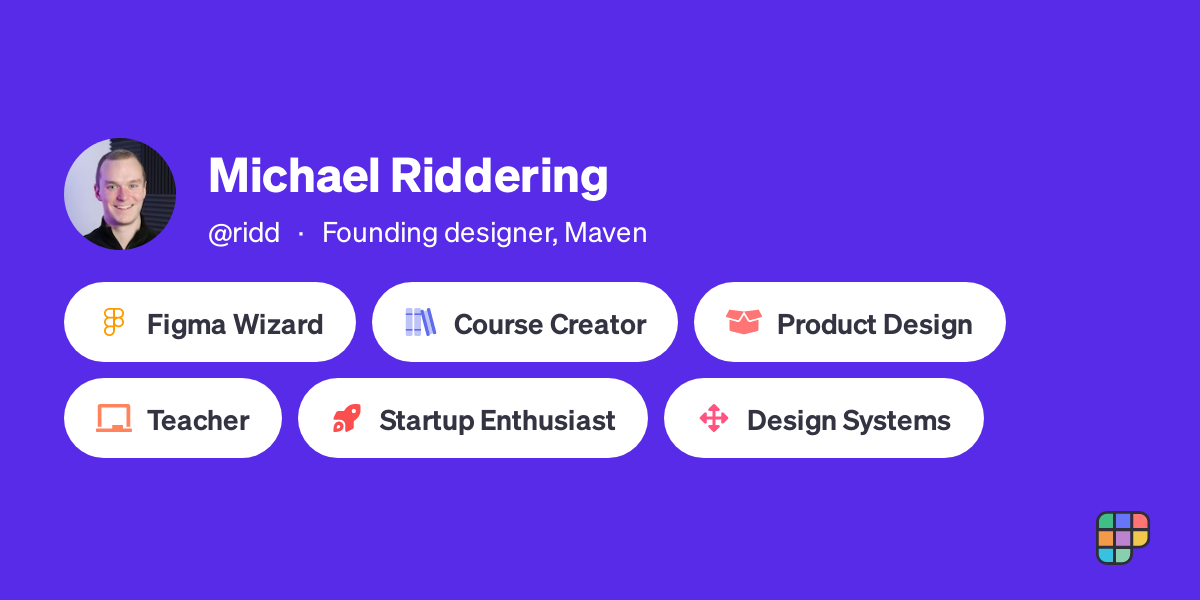Editor’s note: This conversation was adapted from the Polywork Conversations podcast series that took place in 2022. The audio, including timestamps, is below.
Michael “Ridd” Riddering is ready for you to join the discourse around his newfound prosperity: namely that it isn’t in his ability to scale a passion for mentoring and design through his highly successful Figma Academy, but rather his innate tendency to break into dance while designing.
“It might be my secret ingredient,” Riddering joked during an interview on finding success in a side hustle, why he does not plan to give up his day job, and the value of having a 10-year plan.
Below, excerpts from the wide-ranging discussion, edited for clarity.
Tell us about the origin of Figma Academy (1:48)
I realized that I just came alive when I was mentoring people and teaching others, even just working with different designers in old companies. And I wanted to figure out a way to scale that and started thinking a lot about, okay, what would that look like? What kind of mentorship programs are out there? And I remember one day I had this idea of learning Figma inside of Figma itself and I thought that you could build a course inside of Figma instead of like offloading it onto Teachable or something like that. And so I was 100% committed to that.
And so every single thing that I did, whether it was sharing a lesson on Twitter or writing some kind of a thread or actually recording a video, I tried to push my own understanding to the limits.
I'm very much the person that tweets something into existence before I have anything as a way to just hold myself publicly accountable. That's kind of how I roll. I love that. And so I just started kind of talking to people on that mailing list, asking them what they would want to learn. I did a couple surveys, just identifying different keywords and honed in on a more of a technical curriculum. The keyword that really just stood out in all the conversations that I was having with people was this word advanced. And so every single thing that I did, whether it was sharing a lesson on Twitter or writing some kind of a thread or actually recording a video, I tried to push my own understanding to the limits. And that was all the content that was resonating with people before I even launched a course.
Listen to the full conversation here.
What's the next steps for Figma Academy? Where do you see it in a year? (20:31)
That's a really interesting question because I want Figma Academy to be one piece of a larger design education umbrella. And that's the main focus for me right now, where I'm actually actually building out a new type of course collective to make it very easy for people to learn from the best designers on the planet, to get into the weeds of very, very, very specific, more advanced skillsets. Because even piggybacking off of this conversation we were having around this advanced niche, I think that applies everywhere. And yeah, for sure, in a world where courses are very beginner-driven, I think that the best designers are the ones that just never stop learning and there's always someone else to learn something from, even if you're more senior in your career.

Check out Ridd's profile on Polywork
And if you're a designer listening to this, there's a pretty good chance that you probably follow most of, if not all of the instructors on there. So that's what's next. I see Figma Academy being a piece of a larger puzzle. And when I kind of look back and, I mean, I'm so grateful for all of the doors that Figma Academy has opened. Obviously financially is one, it's totally changed my life, but it's also afforded me a level of social capital even, which sounds really weird to say, but it’s huge.
I went from zero people knowing my name, coming from failed startups and working on small teams to being able to DM anyone. And that's crazy still. It just blows me away on a daily basis. And so that was kind of the thing was like, how do I leverage this newly acquired social capital to build something that's huge. I wanna take a really big swing. So that's what's next.
Is polywork possible? (25:30)
Yeah, it's a good question with many different angles to the answer. I guess the starting point is that I'm really blessed to work for a company that does encourage it. And a lot of the people at Maven are tinkering and working on side projects and things like that. And I think that they see the reality that like, you know, this makes me a better employee.
You know, it's a huge driver of my own growth in multiple ways. Because one is like the very obvious thing where, man, what, in order for me to create this content, a lot of the experimentation that I'm doing is in the Maven systems and how I'm actually working on Maven. And so, like looking at the component properties lesson that I just made, which is top of mind, I was working through this rather complex card component set, and I was actually trying to figure out, man, how do I do this? And my own experimentation within Maven was what unlocked a large part of that lesson.
At what point does it not make sense to work full-time anymore? (34:35)
I'm playing the long game, so it's not a one year plan. Ultimately it's in my head more of a 10-year plan. So that's kind of how I look at it, which is why I am allocating my time the way that I am. Because honestly, if I was working for any other company, I think I would've quit by now.
I'm spending, I don't even know, 10 to 20 hours a week on my own stuff and on pace to probably generate more than a million dollars this year, which is insane.
I'm spending, I don't even know, 10 to 20 hours a week on my own stuff and on pace to probably generate more than a million dollars this year, which is insane. And definitely more than I'm gonna make spending over twice as much time working at Maven.
You’re remarkably transparent about your journey. Why? (51:31)
There's so many fun details in the business side too…we all want the story of someone making it big from a passion project. But what I think that I, at least I don't see a lot of is (saying) it's okay for someone's passion to actually be just growing a business and hopefully you like the thing that you do a hundred percent. But the fact is figuring out how to grow a business, how to do marketing, how to do sales, how to set up systems that allow you to scale your time…that's pretty fun actually.
It's a really complex, diversified set of challenges that in my opinion should be celebrated. And ultimately the dollar amount is the fruit. But like, it doesn't even have to be this, I'm either in it for the money or I'm in it because I really love this thing. It actually is really, really, really fun to set out as an individual and try to make money on the internet. It's a blast. Everyone should try to do it. And that journey, the more we document and talk about that journey, the more accessible it becomes.



